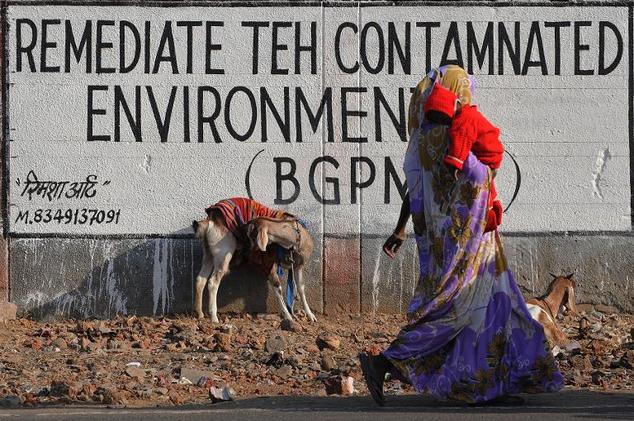
- Rajan’s article on the Bhopal disaster illustrates the negative environmental and social effects that can occur from globalized power structures over the environment. In this example, the power structure is as transnational corporation, with seemingly endless resources and reach globally. Union Carbide, the company responsible for the Bhopal disaster, bought it’s way out of taking responsibility for the environmental degradation and loss of human life that occurred after the accident. This clearly illustrates the ability of elites in power to effectively buy their way out of taking responsibility for the environment, while also showing the use of invisibility to sustain central power.
Bhopal Vulnerability, Routinization, and the Chronic Disaster: Ravi Rajan
- In this article Ravi Rajan explores the processes that have normalized the Bhopal disaster from public notice, and examines how the disaster transformed from a political issue into a private nonissue today, while also examining the factors that produce vulnerability among nation states who are seemingly stable, and have adequately responded to natural disasters in the past. The accident occurred within a manufacturing plant of a multinational chemical company in India, Union Carbide, whose parent company resides in the United States. The company has disregarded safety measures and violated the 1975 Bhopal development plan by housing such a hazardous industry so close to a densely populated area. Several safety standards were also ignored, and Rajan calls into question the reasoning behind the lack of safety systems set up by Union Carbide, and claims there is a direct correlation between the economic class of the employees and citizens living the area, and the vulnerability to the risks created by the company and lack of safety measures. Once the disaster occurred, Union Carbide enacted a system of erasure and denial for the accident, rejecting any responsibility for the accident and using a “blame the victim” framework, claiming the high rate of mortality was due to high malnourishment in the area, not the chemicals themselves. Essentially this article examines at power structures and vulnerability levels of multinational corporations like Union Carbide, and impoverish citizens of developing nations like those in India. The fact that the corporation had the resources and wealth, while the citizens of the country had no power or wealth to stand up to the corporation, made an accessible exit plan for Union Carbide.
Benson, P., & Kirsch, S. (2010). Capitalism and the Politics of Resignation. Current Anthropology, 51(4), 459-486. doi:10.1086/653091
- In this piece, Benson and Kirsch argue for a reorientation of the way anthropology and the public in general examine power structures, specifically claiming a need for in depth analysis on the strategies corporations use in response to their critics. They argue that in employing critique strategies, corporations facilitate the perpetuation of harm. Three main phases of corporate response to critique are outlined; phase one is outright denial by the corporations that a problem exists, phase two involves some acknowledgement of validity behind critique and openly admits there is a problem, while phase three is crisis management in which the corporations are forced to actively engage with their critics and take the problem head on. In presenting their argument, Benson and Kirsch use case studies surrounding both the tobacco industry and the mining industry to situate corporate response mechanisms in real-world examples. Furthermore, the use of case studies illustrates how these response mechanisms work to protect industries from potential delegitimization and allow them to continue operating in favorable regulatory environments. The authors note that there is ample anthropological research regarding power structures and corporations, but little exists to specifically examine the political processes corporations use to promote their own interests. An important concept used is “the politics of resignation.” This concept can be seen as the prevalent feeling within late modernity that is characterized by a tendency to act cynically in political life. Essentially, the politics of resignation create a widespread feeling among citizens of the state that they are unable, incapable to change [in this example] the structure of corporate processes. Furthermore, Zizek’s concept of “cynical distance” embodies the idea of politics of resignation. Cynical distance refers to the idea that citizens are taking an ironic distance, shrugging their shoulders to separate themselves from political systems that recognizes the serious harms surrounding corporate capitalism. To illustrate corporate response mechanisms, authors use the tobacco industry, when the industry denied the direct link between smoking and cancer until the mid 1990’s, although clear scientific evidence was released several decades earlier connecting smoking to disease. Once the direct link was no longer feasible to deny, the tobacco corporations used shifting justifications to argue for the continued production and legitimization of the tobacco industry. In recent times, the tobacco corporations now stand behind the argument that it is an individual consumer decision, and does not wholly affect the masses. I think this piece does a great job at bringing to light a major issue within anthropological study of power structures, in which too much emphasis on the governmental power is placed. I also agree with the author’s use of “harm” industry to exemplify the agentive quality of how corporations impact populations and environments. If we can more deeply analyze the processes and mechanisms corporations use to rid themselves of environmental responsibility, we can more effectively combat these mechanisms and force corporations to create more sustainable practices.
*See abstract filing cabinet for further information